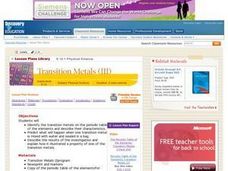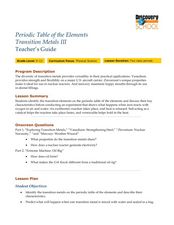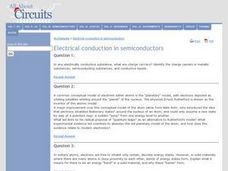PHET
Conductivity
Human bodies can conduct electricity—that doesn't sound like it would feel good! Learners explore conductivity through the use of this simulation. They see why metals conduct electricity and plastics don't and why some materials will...
Virginia Department of Education
Metals, Nonmetals, and Metalloids
How can one easily classify metals, nonmetals, and metalloids? Pupils answer this question as they experiment with unknown substances and perform tests on conductivity, brittleness, and malleability to determine which unknown belongs in...
Chemistry Teacher
Metals, Nonmetals, and Metalloids Lab
What an exciting way to introduce your blossoming chemists to the world of metals, nonmetals, metalloids, and polymers! Here is a lab activity that is designed to allow pupils the opportunity to visualize the reaction of metals,...
Curated OER
Metals and Non-metals
A half-page chart compares the properties of metals and nonmetals. Properties include appearance, melting and boiling point, density, strength, malleability, ductility, heat and electrical conductivity, and the nature of their oxides....
Curated OER
Properties of Metals
Fifth graders study the properties of metals and use them to identify different properties. In this metal properties instructional activity students complete a demonstration .
Curated OER
Amazing metals: Nevada quarter reverse
Nevada's nickname is "The Silver State" and metal is what this lesson plan is all about. Pupils will make a T-chart to discuss the differences between metals and minerals, then write and explain the properties of metal. They will get...
American Chemical Society
Heat, Temperature, and Conduction
How does heat move from one item to another, even when the items are in different states of matter? Pupils experiment with adding washers to hot water and adding hot washers to room temperature water to observe the heat transfer.
Curated OER
Transition Metals (II)
Students discuss transition metals, their properties, and where they are located on the periodic table as well as why transition metals are ideal for coins. After discussion, they conduct an experiment using copper in the form of old...
Curated OER
Atmospheric Processes - Conduction
Students explain the process of conduction using a molecular explanation, and explain how different materials conduct at different rates.
Curated OER
Transition Metals (III)
Students discuss transition metals, where they are located on the periodic table, some of the element in the group, and some characteristics of the group. They work in groups to conduct an experiment in which they mix transition metals...
Curated OER
Heat Transfer Demos
Step-by-step instructions are given for two hands-on activities. Young scientists cut out a paper spiral and hold it over a hot plate to demonstrate convection, and they place a small piece of wax on the end of a metal rod opposite the...
Curated OER
Lab 23-Follow Up Questions-Conductivity
In this conductivity learning exercise, students answer post lab questions about substances that transferred electrons resulting in electricity flowing through the conductivity leads use to test each substance.
Curated OER
The Properties of Metals
In this properties of metals worksheet, students read about the history of metal use and their properties. Students read about metallic bonding and answer three questions about bonding in metals.
Curated OER
Conduction, Convection, Radiation, Oh My!
Students draw a line graph, and use graphing as a tool to discover more about conduction, convection and radiation. They should design their own experiment using heat sensitive paper to show they explain these 3 processes.
Curated OER
Name that metal!
Learners have to have had some experience with metals prior to using this worksheet. They are given five properties common to five different metals. They create or use a dichotomous key to identify the five mystery metals. Tip: This...
Curated OER
Ring-A-Ding-Ding!
What sound does metal make when you hit it? Kindergartners and first graders conduct an experiment about the properties of metal. First, they draw a line between metal items and descriptions of each. Next, they use a magnet to see which...
Curated OER
Types of Bonding Lab
Chemistry lab learners experiment to identify a series of unknown compounds. They choose which tests to perform, but you may suggest melting or boiling point, solubility, electrical conductivity, and malleability. This is a terrific...
Curated OER
Pursuit of The Properties of Metals and Nonmetals
Students examine how every element is classified based on the physical and chemical properties. In this properties of metals lesson students divide into groups, complete a lab and finish a data sheet.
Curated OER
Metals, Non-metals, Metalloids
Students discuss the physical and chemical properties of metals and non-metals. As a group, they classify items as a metal or non-metal. Using the periodic table chart, students discuss the characteristics of each metal. Based upon...
Curated OER
Periodic Table of the Elements: Transition Metals
Students conduct an exothermic reaction to investigate the properties of a transition metal. In this periodic table lesson, students identify the transition elements and discuss their properties after watching a video. They conduct an...
Curated OER
Metals and Non-Metals
In this metals and non-metals learning exercise, students read an explanation of metals and non-metals and then answer three questions for each about conductivity and form.
Science Matters
Thermal Energy Flow in Materials
The sun sends the earth 35,000 times the amount of energy required by all of us on the entire planet, every day. The fourth lesson in the 10-part series looks at how light energy from the sun transfers into thermal energy. Scholars build...
Curated OER
Chemistry: Metals and Non-Metals
Students conduct an experiment to test the reactivity of metals and non-metals. In this chemistry lesson students test metals with different chemicals to observe the reaction. The results are used to categorize the metals.
Curated OER
Electrical Conduction in Semiconductors
In this electronics worksheet, students explore the properties of semiconductors to complete 17 short answer and problem solving questions.

























